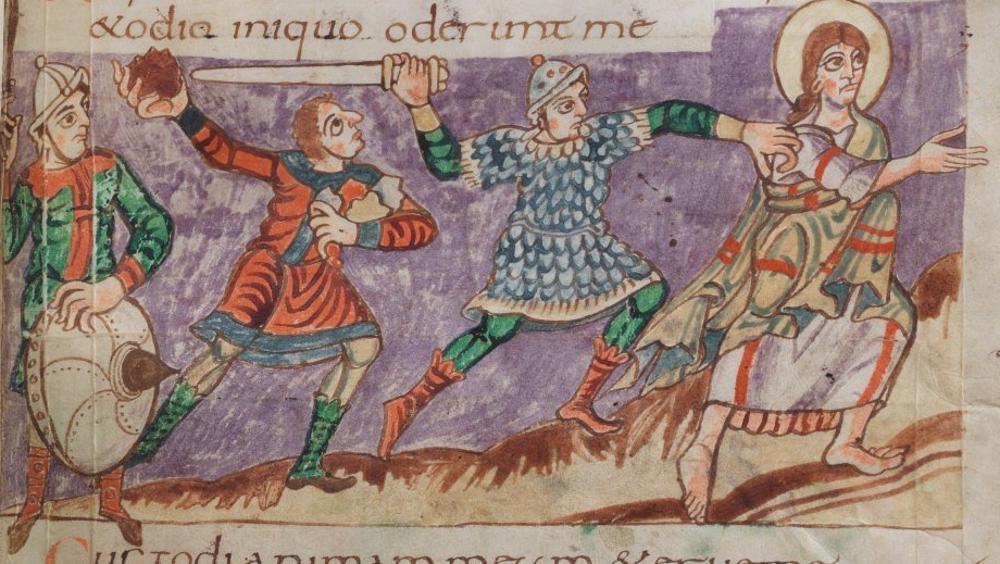
Were the armies of the Germanic kingdoms of Post-Roman Europe essentially Roman, the descendants of Late Roman field armies; essentially Germanic, the descendants of tribal warbands; or something in between? A thread: 

It's clear that all of them were based around the retinues of powerful individuals, whether kings, lesser noblemen, or even bishops. However, the political and social role of such men was more complex than might be imagined, acting variously as royal officials or elite soldiers. 

The 6th century Frankish Salic Law describes two types of royal retainers: the higher ranking antrustiones and the pueri regis - literally "royal boys." The antrustiones, at least, were a legally distinct category, with a higher weregild than ordinary citizens. 

The pueri were young, unmarried, landless men who lived in the king's household at his expense. The antrustiones, on the other hand, were probably promoted from the ranks of the pueri and rewarded with lands of their own, and often served away from the king as public officials. 

These men were a service aristocracy, not vassals. Their position depended on royal patronage and rewards for military service, not their lineage or independent inherited lands. Over time, however, this land became increasingly hereditary in the hands of specific families. 

Similar groups are found in other Germanic kingdoms: Visigothic gardingi, Lombard gasindii, and Anglo-Saxon gedricht. Procopius also describes Ostrogothic royal bodyguards who he anachronistically calls hypaspists, in imitation of the classical authors he was inspired by. 

It is tempting to see such men as characteristically Germanic - Tacitus, writing in the 1st century, describes how groups of young men would attach themselves to chieftains. These warriors ate at the lord's table and were rewarded with gifts; they gave him loyalty in return. 

If he died in battle, they were expected to avenge him, and it was considered deeply shameful for them to outlive him or outshine him on the battlefield. A similar ethos is expressed in epic poetry like Beowulf and Y Gododdin (although the latter isn't Germanic). 

However, we shouldn't ignore the Roman antiscedants for this system as well. The late Roman emperors depended on a unit called the Protectores Domestici, which like the antrustiones did double duty as bodyguards and public officials. 

Many senior Roman officials, including Stilicho, Aetius, and Belisarius, also maintained and relied on private mercenary bodyguards called bucellarii, literally "biscuit eaters." They were maintained by and loyal to the official personally, not the empire. 

Many of these soldiers were Germanic, and the term bucellarii is also frequently used to refer to the retinues of Germanic kings. Many of these kings had, themselves, began as Roman generals, and their retinues would have evolved directly out of the soldiers they commanded. 

There was another aspect to these armies, although it steadily decreased in importance overtime: the general levy of all freemen. Again, we'll turn to the Frankish system as an illustration, although it appears to have been similar in the other Germanic kingdoms. 

The Salic Law maintained a distinction between Franks and Romans, with the former being exempt from taxation but subject to military service. The mustering of armed freemen was also politically important - it served to demonstrate royal power and, in theory, acted as a assembly. 

At least some Romans could be called up - Gregory of Tours frequently mentions contingents of men supplied by the Civitates, the old Roman local governments. However, this seems to have been unique to Gaul. Generally, in this period, Romans paid taxes and Germani bore arms. 

Over time this ethnic distinction and the system it upheld broke down. As the proportion of "Franks" - the legal category, not necessarily the ancestry - increased, kings tried with varying degrees of success to impose taxes on them in the manner of their Roman subjects. 

The general levy of freemen, and the political rights that came with it, also fell into disuse. By the Carolingian period, Frankish armies relied far more on "Scara" - select groups of landowners and their retinues, and similar trends can be seen in other Germanic kingdoms. 

I think these armies should be seen as hybrids, with Germanic influences but ultimately the product of of the specific period the were created in. As is probably obvious from this thread, how armies were organized has implications beyond the battlefield. 

Those who hold political power are those who fight, especially in this period. The shift from reliance on the levy to the retinue was also a shift in political power from the king to the landowning aristocracy, and set the stage for the growth of medieval feudalism. 

The best source on this process in Warfare and Society in the Barbarian West 450-900 by Guy Halsall; Chris Wickham also describes it in The Inheritance of Rome, although it isn't the focus.
• • •
Missing some Tweet in this thread? You can try to
force a refresh








